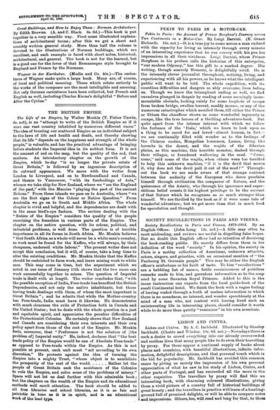THE BRITISH EMPIRE.
The Life of an Empire, by Walter Meakin (T. Fisher Unwin, 6s. net), is an "attempt to write of the British Empire as if it were one vast country inhabited by numerous different races." The idea of treating our scattered Empire as an individual subject to the laws of life and health and death, and thereby showing that its life "depends on the happiness and strength of the whole people," is valuable, and has the practical advantage of bringing before students the Imperial idea in its noblest form. It is not the amount of red on the map, but the quality of the red, that matters. An introductory chapter on the growth of the Empire, which to-day "is no longer the private estate of Great Britain," is followed by an ingenious description of its outward appearance. We move with the writer from London to Liverpool, and on to Newfoundland and Canada, and thence to Vancouver, "with its forebodings of Asia," whence we take ship for New Zealand, where we "see the England of the past," with the Maories "playing the part of the ancient Britons." From these islands we pass on to Australia, where "we see the first signs of the Colour or Native Question." From Australia we go on to South and Middle Africa. The whole chapter is vivid and helpful, and the dependencies are dealt with in the same bird's-eye fashion. The section dealing with the "Rulers of the Empire" considers the quality of the people exercising the franchise in various parts of the Empire. The chapter on the native question, with its colour, political, and industrial problems, is well done. The question is of terrible importance in all its forms in South Africa. Mr. Meakin believes "that South Africa as a whole will never be a white man's country, as work must be found for the Kaffirs, who will always, by their cheapness, undersell white labour." The present writer does not accept this conclusion, but it will, of course, take a long time to alter the existing conditions. Mr. Meakin thinks that the Kaffirs should be restricted to farm work, and leave mining work to white men. This may come in time, but the experiment which we noted in our issue of January 11th shows that the two races can work successfully together in mines. The question of Imperial trade is 'dealt with at length. The writer concludes that, "with the possible exception of India, Free-trade has benefited the British Dependencies, and not only the native inhabitants, but those having trade dealings with them, of whom the most important is Great Britain " ; and he admits that while the Mother-country has Free-trade, India must have it likewise. He demonstrates with much clearness the evils of Protection both in Canada and the United States ; but he deals with the whole question in a just and equitable spirit, and appreciates the peculiar difficulties of the Protectionist Colonies. He certainly shows that New Zealand and Canada are considering their own interests and their own policy apart from those of the rest of the Empire. Mr. Meakin feels, moreover, that "Preference is not the solution of [the problem of] Imperial unity." He, indeed, declares that "the best trade policy of the Empire would be one of Absolute Free-trade" as opposed to Free-trade within the Empire. As this is not possible at present, each unit must "act according to its own discretion." He protests against the idea of turning the Empire into a mighty Trust, "whose object is to annihilate the prosperity of the rest of the world Rather let the people of Great Britain seek the assistance of the Colonies to rule the Empire, and solve some of the problems of misery." Space will not let us deal further with this admirable book ; but the chapters on the wealth of the Empire and its educational methods well merit attention. The book should be added to all free libraries and school libraries, as it is as fair and patdotio in tone. as it is in spirit, and is an educational work of the beat type.






















































 Previous page
Previous page